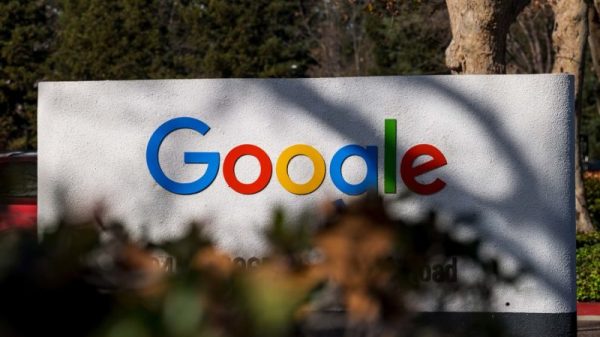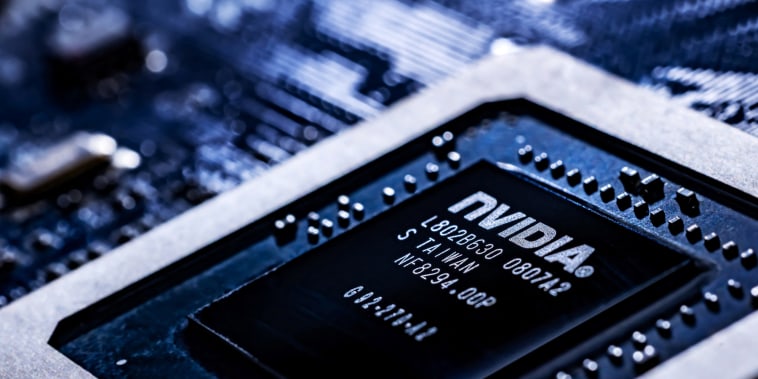The business world is increasingly banking on artificial intelligence to be the next big thing, and has found itself turning to one maker of computer chips in particular — Nvidia — to power the revolution.
Since 1993, the Santa Clara, California-based company has been designing programmable chips that help run an array of consumer-facing applications.
While Intel and Advanced Micro Devices had dominated the U.S. chip sector for decades, Nvidia’s entry signaled the advent of sophisticated graphics processing units (GPUs), which were better able to render images. That capability became ever more important as high-quality video increasingly dominated the tech and media landscape.
At first, Nvidia was most associated with providing GPU processors for video game consoles like the Microsoft Xbox and Sony PlayStation.
The general growth of Silicon Valley during the 2010s prompted Nvidia to diversify and improve its fortunes. For example, in 2014, Nvidia and Google announced a partnership to use Nvidia chips in Google Chromebooks.
Auto companies also began turning to Nvidia chips for use in driver-assistance software that depends on GPUs to process image information from sensors. Nvidia hardware is also found in all Tesla vehicles.
During the pandemic, the shift to remote work and subsequent demand for data centers that could enable cloud-based computing — plus even more interest in video games while everyone was stuck indoors — accelerated Nvidia’s revenues even further.
Still, the company’s $22 billion in annual revenues in 2022 remained dwarfed by rival Intel’s $63 billion that year.
It was not until the last year and a half or so that Nvidia’s outlook went truly stratospheric with the onset of the artificial intelligence revolution.
The chips that Nvidia specializes in, known as “discrete” GPUs, specialize in so-called parallel computing. This is a type of computing in which multiple processes are carried out simultaneously. By contrast, CPUs carry out programs serially, or sequentially. The type of computing GPUs handle is thus more efficient and more valuable than CPUs.
Programmers have learned that Nvidia’s GPUs are much better suited for programming AI software.
Bloomberg News has called Nvidia’s chips the “workhorse for training AI models,” and PNC Financial Services Group analyst Amanda Agati described Nvidia’s lead in the category last fall, based on its valuation, as a “quasi monopoly.”
So Nvidia owes some of its success to having pioneered the technology that AI applications now depend upon.
Today, virtually every major tech company, including Amazon, Google, Meta, Microsoft and Oracle, has made use of Nvidia chips.
On Thursday, Nvidia reported earnings and revenues that significantly surpassed market expectations, helping lift the company’s overall value past $2 trillion, trailing only Microsoft and Apple among the largest U.S. firms.
“Accelerated computing and generative AI have hit the tipping point,” Nvidia CEO and co-founder Jensen Huang said in the earnings release. “Demand is surging worldwide across companies, industries and nations.”
About $1.7 trillion of the market capitalization growth has come in the past 16 months alone, according to Goldman Sachs. Huang acknowledged in an interview with CNBC last year that a combination of luck and skill has led to the company’s success.
“We just believed that someday something new would happen, and the rest of it requires some serendipity,” Huang said. “It wasn’t foresight. The foresight was accelerated computing.”
For Moody’s Senior Vice President Raj Joshi, Nvidia represents the “dominant” infrastructure player behind the current rise of the AI sector.
While other chip designers are working to catch up to Nvidia, the company’s three decades’ worth of GPU specialization — compared with a competitor like Intel, which has historically specialized in CPUs — represents a massive advantage, he said.
“This emerging field [AI] is better supported by GPUs,” Joshi said in an interview with NBC News, adding: “Nvidia is providing the foundation for it in most cases.”
Nvidia also offers solutions for other sectors, like health care, that are not specifically tech-oriented, Joshi said.
“They have a big lead in these markets,” he said.
Nvidia’s specialization means it is able to charge a premium for its products. In fact, its chips, which are manufactured in Taiwan, are so unique that companies looking to build AI capabilities are complaining that there is a shortage of them.
While the Biden administration’s 2022 CHIPS and Science Act is designed to spur development of GPUs — and do so on U.S. shores — there is already concern about keeping up with market forces.
“The volume of chips that [AI companies] project they need is mind-boggling,” U.S. Commerce Secretary Gina Raimondo said this week. She suggested even more federal subsidies would be needed if the U.S. hoped to be a meaningful player in chip manufacturing.
“I suspect there will have to be — whether you call it ‘CHIPS Two’ or something else — continued investment if we want to lead the world,” Raimondo said during a virtual appearance at an Intel event. “We fell pretty far. We took our eye off the ball.”
In the meantime, investor interest in Nvidia remains frenzied. While some have speculated that its success might be a bubble, most Wall Street analysts say its financial statements have been proof that its product is viable.
“The health of their core data center business is genuinely stunning,” Goldman Sachs’ Tony Pasquariello wrote in a note to clients Friday.
Because it is now so much more valuable, Nvidia’s financial results carry greater weight for the overall stock market, namely the S&P 500 index. According to Agati, who is chief investment officer and managing executive for investments at PNC, 60% of the earnings growth among all S&P 500 companies for the most recent quarter came from Nvidia alone.
In other words, for the moment, as Nvidia goes, so goes the market, which could be a financial boon for consumers who hold investments in the stock market — whether individually, or through their retirement accounts.
“[Nvidia] has become critical to the market’s path forward,” Agati said in an email to NBC News, adding: “In the saying ‘data is the new oil,’ Nvidia continues to prove it is in a league of its own.”







































